#black women's spiritual empowerment
Text
What they don't tell you about manifesting
A lot of folks talk about manifesting what you want in your life and I think that’s great. But the thing is that rarely are people talking about the truth of what doing that work entails which leads me to believe that they may be missing some key components. Manifestation is great work and it can be a lot of fun, but if you are not doing “the work” then your manifesting will not be successful. In the episode I talk about my journey and what I’ve learned.
#black women spiritual wellness#healing spaces for black women#empowering black women spiritually#sacred self-care for black women#black women's holistic healing#mindfulness for black women#inner peace for black women#spiritual growth for black women#wellness resources for black women#black women's meditation practices#self-discovery for black women#affirmations for black women#holistic wellness for black women#mental health support for black women#community for black women's spirituality#black women's holistic living#nurturing spirituality in black women#holistic self-care for black women#healing journey for black women#black women's spiritual empowerment#blackwellness#healing#ihpwellness#wellness#selfcare#selflove#qtbipocwellness#qtbipoc#spiritualwellness#blackwomenhealing
2 notes
·
View notes
Text
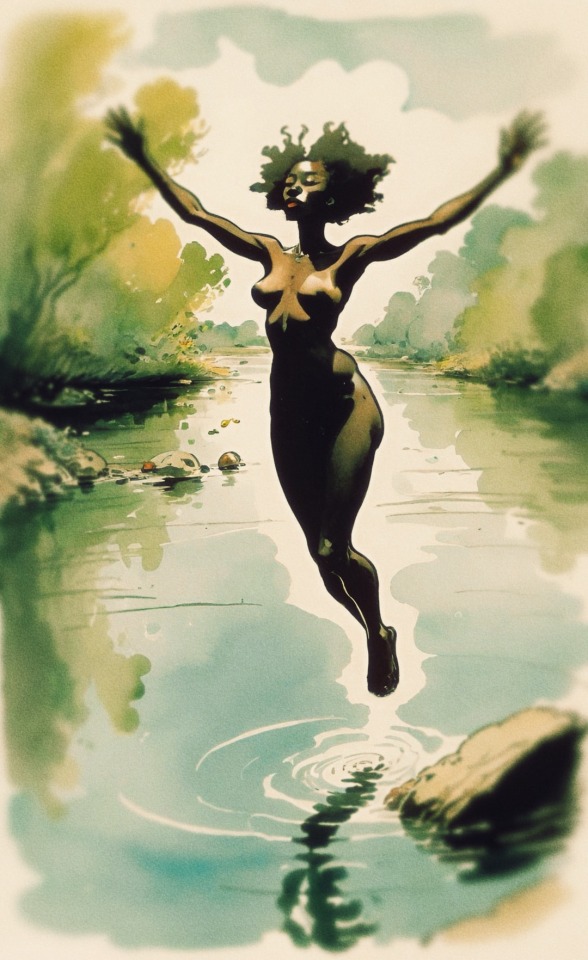
I will take that jump, leaving behind the story where I repeat familiar old trauma and I will embrace the untold story that unfolds as I create a new way of being for myself.
#pagan#spiritual healing#healing#spirituality#nature#paganism#earth#self care#self love#affirmations#affirmdaily#women#black women#art#quotes#self empowerment#self discovery#adventures#water seer#leap of faith#affirmyourreality#love#relationships#friendships#black witch#black witches#pagans of color#witches of color#pantheist
21 notes
·
View notes
Text
Into the Wonder…
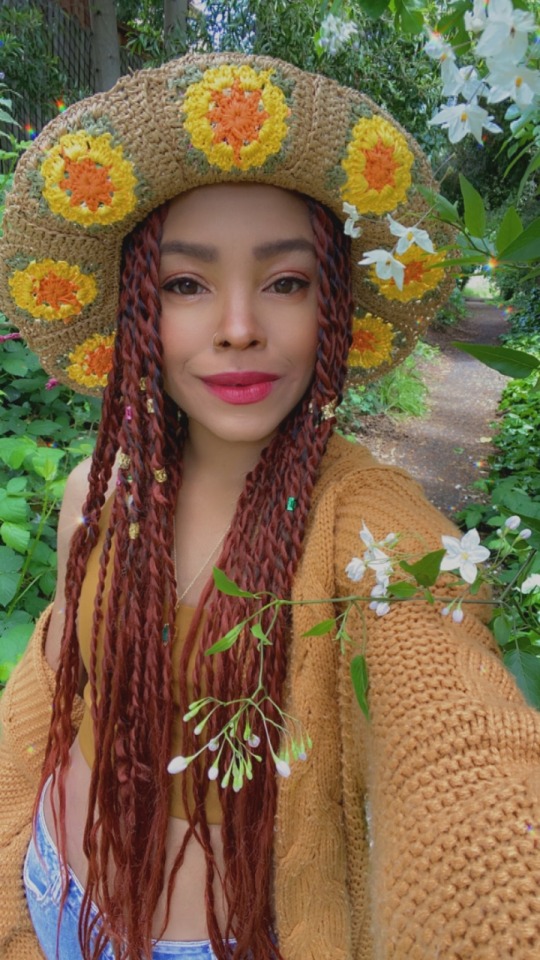

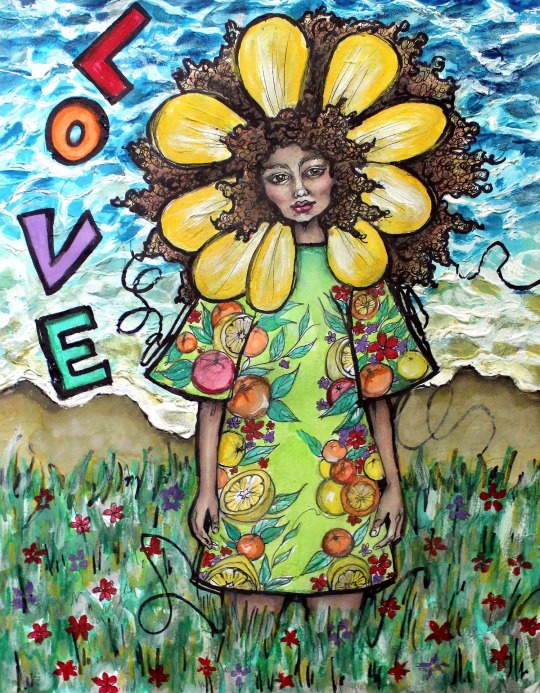
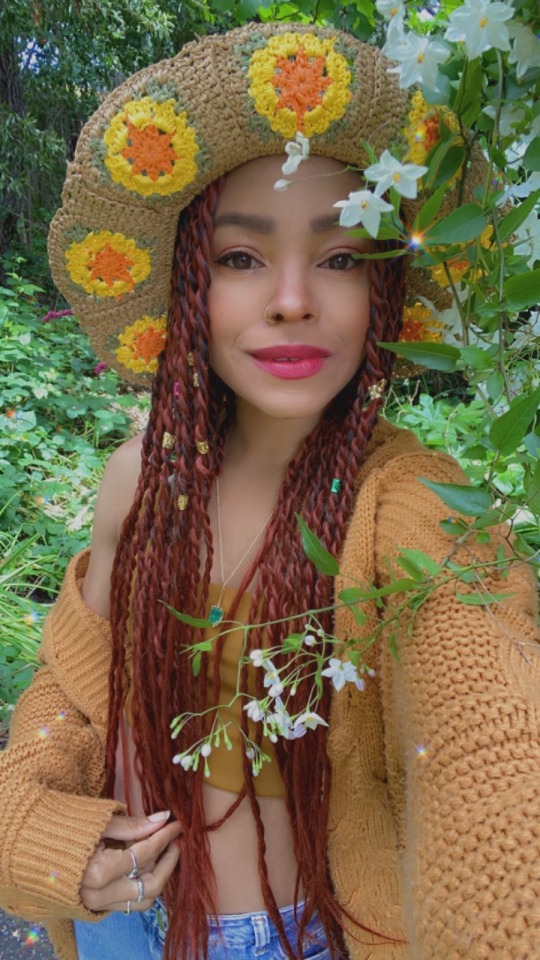

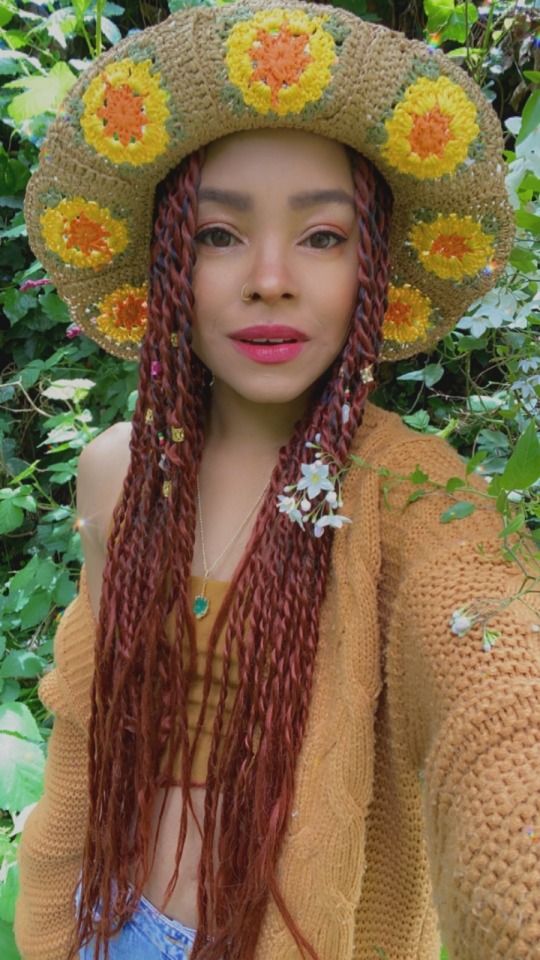



Not all those who wonder are lost…
#artbybrette#art#quotes#artist#quote#women#illustrations#illustration#drawings#consciousness#nft community#black women artists#women artists#women empowerment#spiritual development#spiritualgrowth#black women#black girl magic#nature#nature photography#nature lover#nature walk#beauty#beautiful women#mixed women#black hair
4 notes
·
View notes
Text
Unveiling the 7 Chakras Through Cinematic Vibes
🌈✨ Ever heard about chakras? They're the energy centers in our bodies, each associated with specific qualities. From the rooted vibes of the first chakra to the cosmic energy of the seventh, join us as we explore the world of chakras through the lens of
Hey Nubian Souls,
Welcome back to Something Nubian!
Today, on this Soular Plexus Day, we’re diving into a journey of self-discovery, empowerment, and cultural resonance as we explore the chakras through the lens of melanated experiences. Buckle up for a ride through movies and shows that align with each energy center, bringing positive vibes to our melanin-rich community.
Root Chakra…
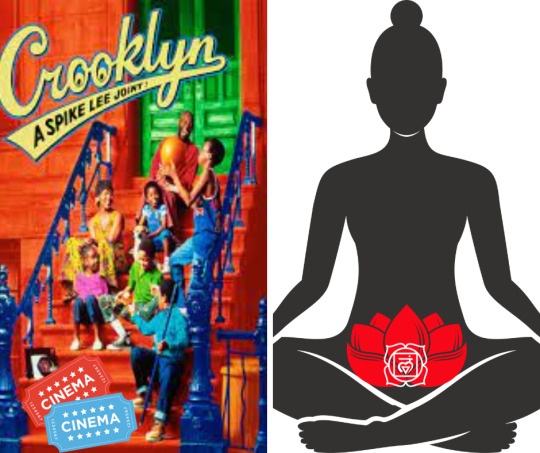
View On WordPress
#Black Excellence#Chakras#Cinematic Vibes#Cultural Resonance#Diversity in Film#Emotional Resilience#Empowered Women#Empowerment#Family Roots#Healing Stories#Inner Vision#Melanated#Melanin Magic#Movie Recommendations#positive energy#Representation Matters#Self-Discovery#Soulful Cinema#Spiritual Awakening#TV Shows for Melanated Souls
1 note
·
View note
Text

0 notes
Text
Your Spiritual awakening is your spirit saying
Come home,
enough.
It’s you choosing your own path
It’s choosing to respect your own rhythm
Finally allowing god to show what she looks like on you
📖: letter to the bold
~ese~
#poetry#divine feminine#art#feminine energy#healing#women empowerment#poem#black women#love#goddess#letter to the bold by ese#spiritual awakening#spiritualgrowth#flow#eyes#into the ether#dark feminine energy#body mind spirit#mirror work#god is a woman#oshunenergy#daughterofosun
1 note
·
View note
Text
Perspective Shift: Accepting Help
Perspective Shift: Accepting Help
We talk about perspective ALOT on the When Queens Link podcast + to be honest, I wrote this little note to myself after I started feeling better + regaining my strength from COVID + the accident.
But, before I wrote it, I felt so bad. Helpless even. I hated not been able to get up out of bed + do things for myself. I hated having a limp in my walk or having to hold on to the wall so I wouldn’t…

View On WordPress
#Black women#Chicago#empowerment#encouragement#faith#focus#God#happiness#joy#mothers#motivation#relationships#self-care#self-empowerment#self-love#self-worth#Sincerely Tyra#sincerelytyra#SlayTheDream#spirituality#struggle#writer
0 notes
Text
Here's my unwanted opinion on some witchcraft books
This is a list of opinions I have on some popular witchcraft, occult and practitioner related books. I don't talk about anything I haven't read myself.
This is in no way stopping you from reading them yourself, it's just what I think of them as an experienced practitioner and pagan.
I now have a Goodreads account you can look at if you're curious what else I've read but it's a mess and I've just added my bookshelf on in bulk.
Lisa Lister - Witch
To get this out of the way. It's bio essentialist crap and we all know this by know but it bears repeating. This is an example I've used in my grimoire of how transphobia seeps into spiritual spaces and goes unchecked under the guise of feminism and women empowerment. Arguing that a witch's power comes from her womb as a bowl of nature and creative magic. If that's what you like to draw from then all power to you, I have no problem with that. What I have a problem with is that Lister directly infers that the title of 'witch' is exclusive to this specific demographic of women.
I find her statements gross and dehumanising to women and her argument falls apart completely when you remember that not every woman has a womb, big duh moment I know. It correlates with TERF ideology that certain women are inherently more powerful because of a female reproductive system as opposed to women as a whole being powerful because of their autonomy as human beings. "But if that's true then what's stopping cis men, trans and nonbinary people from being practitioners?" LITERALLY NOTHING!
Sky Alexander - The Modern Witchcraft Spell Book and The Modern Witchcraft Grimoire
Very simple. Pretty cover. Overall they make for ok resources for beginners but once you're out of the beginner phase they really fall flat. Alexander doesn't provide much context when referencing certain tools and practices and tends to confuse witchcraft with wicca.
The Farrars - A Witches' Bible
Dated. Uses the G slur. Their books are all mislabelled wicca which makes sense because these books have been around since the 90's when there wasn't much of a difference and you can tell. They do not hold up to today's standards. They are a good example of how practices have historically been conflated in pop culture.
Does discuss ritual nUdity (they call it skyclad) and includes pictures. I wanted to mention it here to not surprise anyone in case any of you aren't comfortable with it.
Rachel Patterson - Grimoire of a Kitchen Witch
A book about kitchen witchcraft that doesn't include any kitchen witchcraft. It's more like a basic beginners grimoire. Very repetitive.
Features a chapter on hoodoo which I'm unsure about. I don't know anything about hoodoo or rootwork but I'm assuming it's a practice exclusive to the black community in America due to it developing during the period of enslavement in the US. I'm also assuming that Patterson isn't a part of this community due to being white and British. If I'm wrong and Patterson is genuinely part of the practice and can honestly speak on the topic please correct me.
Scott Cunningham - Encyclopaedia of Magical Herbs
A good resource for correspondences, easy to digest but Cunningham focuses on wicca (again) using wiccan practices like complementarianism and gendering nature which to me makes no sense (I know about the law of polarity but I do not agree with it). The pictures of plants are nice but the folklore provided for them is pretty minimal. You can find all the same info for free online.
Judika Illes - Encyclopaedia of Spirits
Honestly not that bad. There's a lot of information and it's pretty consistent throughout. It's a huge book though, it can be kind of overwhelming but they take from multiple sources when discussing the mythos of deities which is a plus. The pages are very thin and delicate which can make it hard to read the text.
Joey Hulin - Your Spiritual Almanac
it's eh in the broadest sense. I liked the folklore and the eco action sections but I didn't really absorb any of it. a lot of the corresponce lists was information I already knew about. It felt very repetitive. Would have loved to have seen more detailed information about the changes happening in nature each month.
Rachel Pollack - Seventy Eight Degrees of Wisdom
Pollack is very informative, and honestly a great resource for tarot work, she knows her shit and isn't afraid to info dump. The only thing I didn't really like is all the mentions of dualism like of mother v father, male v female but that's entirely my issue and it's the nature of tarot to be dualistic, It just isn't a necessity to me and my practice. Still a great book.
Aleister Crowley - Magick
A great example of what not to do. Appropriates dharmic practices and Jewish mysticism. When he wasn't stealing from other cultures or being a massive contrarian Crowley was writing about sex magic and it's discussed here in uncomfortable detail.
#I will talk about my issues with witchcraft books in a reblog#bear in mind i've only be a practitoner for about 6 years but i've been a pagan my whole life#so i do not have the conventional baby witch experiences which definitely altered my perspective on what i looked for#witchblr#witch#witchcraft#pagan#pagan witch#kitchen witch#paganism#hellenic pagan#hellenic witch#grimoire#witchcraft books#witch books#witchy books#helpol#hellenic polytheism#hellenism#witchy#eclectic witch#pink witch
271 notes
·
View notes
Text
Thinking about how women, on the whole, have been more open to astrology in these modern times since it’s been shunned by science and religion. That unfortunately also works to the advantage of people who would like to keep astrology known as just a silly, dumb girl hobby.
But astrology has been around in all cultures since before all major religions. People have always sensed that we can look to the sky, containing the macrocosm outside this microcosm, for understanding.
I wonder what that says about women that they have been more open to believing in this connection we have with the cosmos (and nature) than men have been?
I think that merely on a physical level, womens’ bodies have a deeper connection with the cosmos. We have cycles that can sync with the Moon, and we are the sex that brings life from the spiritual to the physical realms, which is a very intimate encounter with sacred forces. Because our bodies are made for an even more intimate connection with nature and the cosmos, I think our minds evolved that way too. I think that on average, we have more developed intuition, and we are more concerned with nurturing life, so we can have a more developed interest and/or ability to see connections between life and natural phenomena.
Black Moon Lilith is still in nearly an exact conjunction with Venus retrograde in Leo, so female empowerment is the name of the game right now. 🖤 I know I’ve been having many thoughts the last few days relating to the natural powers that women have, so I wanted to share some as they relate to womens’ relationship with astrology.
Bask in your primal power today, lovelies!
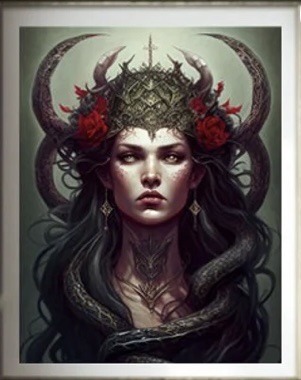

#black moon lilith#lilith#goddess lilith#venus conjunct lilith#astrology 2023#astrology transits#lilith in leo#female empowerment#venus in leo#astrology blog#spirituality#astrologynerd#lilith in astrology#goddesses#woman power#astrology history#astrology is real#venus retrograde#primal#lunar witch#women in astrology
45 notes
·
View notes
Text
Shoshone Hymns (0x10/?) - WIP mess

Preface
Gonna recap on the whole project before I go forth with new articles, as to distill the "nucleus" of my speculative paracosm soon.
To include: Sensory details, "unique pitch selling points", unique cultural practices & traditions, linguistical differences, historical divergences, personalities & relationship dynamics, speculative evolution sapient species, history, lore, major events, myths, legends, technologies, magicks;
So, what really is this "16^12"?
It is a speculative campaign setting and desired reality "shifting framework" to immerse oneself onto as a long-term destination. Essentially a comfy yet nuanced realm with a vastly long diverging history & soft warm natural optimistic dark feel.
Keywords
Soft
Warm
Natural
Dark yet bright
Harmony
Innovation
Optimism
Curiosity
Empowerment
Wholesome
Mysticism
Spirituality
Empathy
AGI Integration
Android rights
Deliberate positivity
Communal
Solarpunk / Lunarpunk
Rollerwave
Groovy
Retro
Old-School
Bronze Age
Y2K (early 2000s)
Tooncore
Laborwave
Neu-Vectorheart
Cassette Futurism
Art Deco
Bauhaus
Art Nouveau
Funk
Cyberware
Biomods
Transformations
Morphological freedoms
Gratis, Libre, Open Source Software... aka GLOSS
Automaton liberties
Knowledge
Progress
Systemic Change
Euphoria
Mundane Slice-of-Life joys
Far far away future as promised to us
Syndicalism
Georgism
Ecology
Embracing life and getting out of mere Escapism & Nihilism
Nuclear Armageddon Threats
Political Intrigues
Bookstore
Prosperity
Chronokinesis
True Polymorph
Synthetic-tier Androids
Educational Prowesses
Photographic Memory
Retrocognition
Polyglot
Intertextuality
History Doctorate
Cycle of Life
Entropy
Coming of Age
Constructing your own meaning even in Darkness
Escalation of Power
Vigilante
Self-Control
Worldly Understanding
Enlightened Despotism
Open Source-y Treescape Iterative Evolution
Copyleft
Index card catalogs
Better Handling of Hispanic Flu
Progressives
Unionist (Democrats+Republicans) Party failing
Public Domain
GNU Hurd earlier (later 80s)
OpenXanadu Protocol
Justice
Queer Acceptance & Integration
Samoan Tech Reverse-Engineering Market
Polish Computing Sovereignty remains and flourishes thanks to ICL & Jacek Karpinski
Failure of centralized social media networks in favor of indie decentralized "federations"
2000s pandemic instead of 2020s
Religious and spiritual researchers harmonize
Data Privacy
Governance Transparency
Black Pyramids HyperMall
Conversation Pits
Mainframe Rooms
Parliament / Senate
Judicial Courtroom
Public Place
Natural Park Preserves
Arcade
Discoteques
Tramway / Subway / Monorailways
Offices
Assembly Floors
French Toasts, Pancakes, Pork
Cafe
Public Library Archives
VLSI College tech classes
University art classes
Autistic meta-patterns
Jin-Roh The Wolf Brigade
Helluva Boss
Wolfenstein The New Order
Wakfu
Jet Set Radio
No Baby-Boomers Managerial Class Overthrow
Video rental stores
Robotic soldiers likewise to Wolfenstein The New Order's
Extended Zodiac Calendar-based generators
Divinely-order beings walking among the living and the dead
Key historically-significant nine USPs
youtube
youtube
youtube
youtube
youtube
youtube
youtube
youtube
youtube
Lisp persisting as a major language family in the tech industry leading to women building several AGI "summers" iterating on top of each other harmoniously... (leading to the android servants of my constructed world, which is one among the many major features derived from such a "liberal" alternate historical pathway)
Why-s for Production
Showcasing pseudo-historical data in a GLOSS manner, stimulating imagination creativity & motivation among Zillenials, intrigue people into research deep dives on history, mostly for personal enjoyment & enhancing my multimedia skillset;
Whys for Target Audience (mid 90s - earlier 2000s youth aka Zillenials)
Motivation, empowerment & plain comfort through curiosity. Also because it shows & explains how to do plenty of creative adulthood things better.
Ideadump 2
4525, Maskoch, "Ava, Klara, Shoshona", Seventies RetroFuturism Residence, Habitable Minivan, Cloven Hoof Shoes, Black Matte Lipstick, Spiral Black Balls, Fem ISO Symbol, #RedInstead Aspie Culture, Conlangs, Ocean of Clades, Second Person Perspective Meta, Pattern Recognition, Poetic Lisp life scriptures, RISC-V+OpenPOWER, KDE Plasma + Liquid, LOT tape storage archivals, hypervisor, Asahi Linux on M3 iMacs, responsive hypertext realm, HTML5+CSS3-only text addventure, rio/acme/p9-2000 userland, yesterweb sites, desktop paracosm simulations through filesystem documents, RTTY / printing radio terminals, VideoTex/Telex Minitel-esque services, "Valenz, Kira, Sina", SVG toon vector virtual web pages, imagination microcosms, miniature dollhouses, animation rigged puppets, VTuber tokens & TTRPG scenes, InfoAddict, Toymaker, Witch, Thinktank, PDP-8/e – DECmate III+, "JusticeKeggan", byzantine soviet-level intrigues, "SAOpatra", "FierceFawlanx", "TheodEnchanter"… ;
3 notes
·
View notes
Text
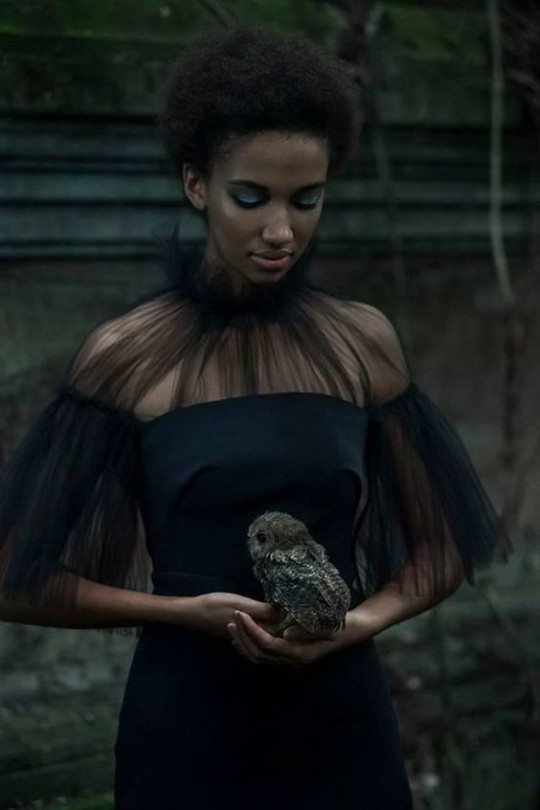
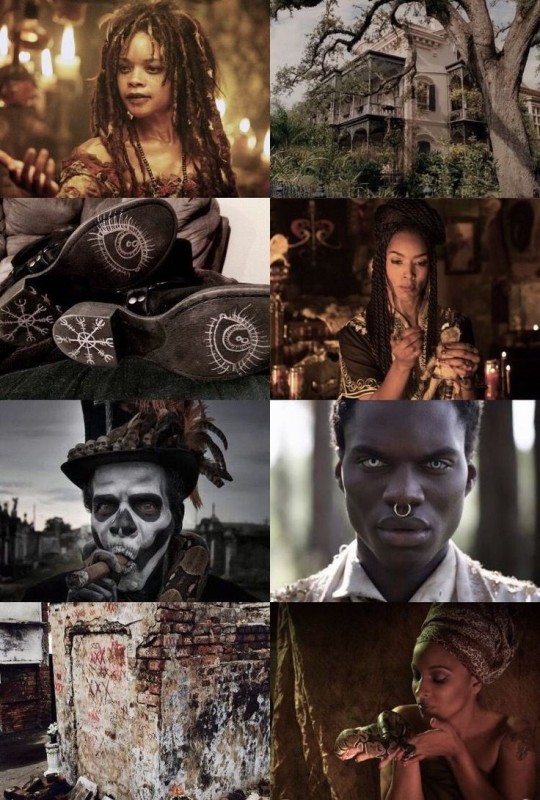
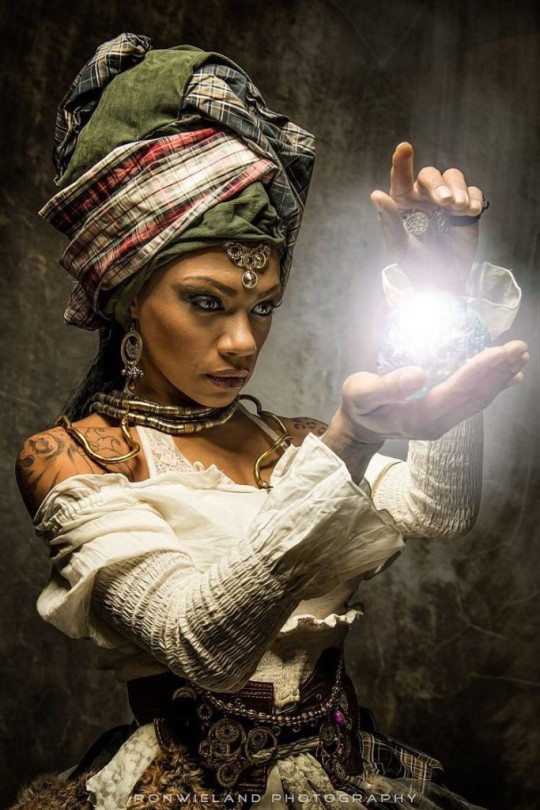



NBCBLK
'We're reclaiming these traditions': Black women embrace the spiritual realm
There's a revived fascination with witchcraft and the occult. For Black women, mysticism’s appeal is about empowerment and taking up space in a world that often marginalizes them.
Image: True Heart Intuitive tarot cards
Cards from Rachel True's new tarot deck and guidebook, "True Heart Intuitive Tarot."Houghton Mifflin
SHARE THIS —
Oct. 30, 2020, 12:32 PM EDT
By Nadra Nittle
Afros. Saris. Sphinxes. Rainbows.
These are some of the striking images found in actress Rachel True’s new tarot deck and guidebook — “True Heart Intuitive Tarot” — released this month with a decidedly multicultural bent. Best known for her starring roles in the 1996 cult hit “The Craft” and the 2002 sitcom “Half & Half,” True has studied tarot for most of her life and wanted her guide to reflect the diversity of her New York City birthplace.
True’s tarot cards, illustrated by Toronto artist Stephanie Singleton, stand out for their inclusive imagery.
“I wanted it to be representative of the world around us,” said True, a rare woman of color to release a deck with a major publisher (Houghton Mifflin), who in 2017 completed a stint as a tarot reader at the House of Intuition in Los Angeles. “I just wanted to have as many skin tones and flavors as we could possibly get in there, and I’m happy about that because I know, for me, when I was reading books and looking at decks, they were all very homogenous.”
Having gained popularity as a parlor game in 15th century Italy — though some have linked them to Mamluk playing cards from Turkey and mystical imagery from Egypt — tarot cards are now widely used for divination and include symbolism that reflect life’s lessons and challenges. But the most established tarot decks have a European aesthetic, which can make it difficult for people of color to connect with them.
Fans have already told True that her collection, which contains both personal essays and card interpretations, is their first time purchasing a metaphysical product by a Black person. Born to a Black mother and a white Jewish father, the actress calls her book release no “small feat” for a woman of color.
Image: Rachel True
Rachel True may be known for her iconic role in "The Craft," but her work in tarot has provided a source for healing herself and helping others.Houghton Mifflin
True follows in the footsteps of other Black artists and creatives such as Courtney Alexander, Manzel Bowman and Tayannah Lee McQuillar who have released tarot decks highlighting Black beauty, culture and experiences in just the last four years. These creators are part of a shift among Black people embracing the mystical and “the dark”: According to the Pew Research Center, the percentage of Black people who identify as spiritual but not religious rose from 19 percent in 2012 to 26 percent in 2017, which is roughly the same percentage of Americans overall who now identify this way.
Black women in particular have launched Black girl magik meetups, witchcraft conventions, hoodoo festivals and goth clothing lines. In addition to writing about tarot, they’ve written books about witchcraft, astrology and the Black gothic, tying these traditions to their cultural and artistic heritage.
But the desire to heal is the major reason these practices appeal to Black women, according to Yvonne P. Chireau, a professor and chair of the religion department at Swarthmore College and author of the 2003 book “Black Magic: Religion and the African American Conjuring Tradition.”
“Black women seem to have more of what I would call an orientation to the therapeutic, and that has been consistent,” Chireau said. “It’s not just about women’s power and witchcraft, and all these wonderful things that the white feminists were about. For almost every Black woman that I know who’s involved in any of these traditions, it comes down to the purpose of this work is ultimately about healing — and not just bodies but healing spirits. So, you won’t necessarily find them out there trying to do spells to remove Donald Trump.”
"For almost every Black woman that I know who’s involved in any of these traditions, it comes down to the purpose of this work is ultimately about healing — and not just bodies but healing spirits," said Yvonne Chireau, author and an associate professor of religion at Swarthmore College.Courtesy Yvonne Chireau
That’s a reference to the widespread media attention mostly white feminist witches garnered in 2017 for their ongoing spell to “bind” Trump — using a photo of him, the Tower tarot card, a candle and other accoutrements — until his exit from office. The spell highlighted the link between second-wave feminism and the New Age movement, both of which have faced criticism for sidelining and appropriating people of color. Since Black women were never centered in these movements, it’s not surprising that their current interest in mysticism may have more to do with healing themselves and their communities than with the current occupant of the White House.
An admirer of the Swiss psychiatrist Carl Jung, True regards tarot decks as essentially “a shrink in a box.” In her book, she recounts how tarot helped her process a difficult childhood. She said her exposure to books such as Jung’s “Man and His Symbols” and Nietzsche’s “Beyond Good and Evil,” along with the tarot, helped to ground her as she grew up.
“You can look at them, and see where they hit you on a visceral level,” she said of the tarot. “I follow a Jungian tradition of tarot, so my interpretation tends to lead you down the path to examining yourself because if there’s one thing I know it’s that I can’t change anyone else. I can only work with myself and shift my own behaviors and perceptions. That’s why I like tarot.”
Although True is passionate about tarot, she doesn’t view it as a practice of the occult, a term she said has negative connotations. Instead, she views tarot as a way for people to tap into their intuition. Similarly, she doesn’t identify as a witch, despite playing one of Hollywood’s most iconic African American witches — Rochelle in “The Craft.” The follow-up to that film, “The Craft: Legacy,” debuted this week and will likely introduce a younger generation to the 1996 version as well.
New Yorker Mya Spalter grew up watching the original “Craft” and appreciating seeing a witch of color. Growing up with a Black Catholic mother and a white Jewish father, Spalter said that she can’t remember not feeling like a witch — “I was always a weird kid” — because of her love of nature. It helped that neither of her parents emphasized their religion to her or made her feel that any form of spirituality was off limits.
She ended up working at New York City’s oldest occult shop, Enchantments, and wrote a 2018 book about the experience and the basics of witchcraft, “Enchantments: A Modern Witch’s Guide to Self-Possession.” With humorous pop culture asides, especially about the ’90s R&B group Bell Biv DeVoe, Spalter’s book not only demystifies witchcraft but also sends the message that one can be a practicing pagan using common household ingredients such as salt, lemon and olive oil—a contrast to the Instagram witch aesthetic where photos of altars with expensive crystals, feathers and stones get thousands of likes.
New Yorker Mya Spalter rejects the idea that all witchcraft needs to be Instagram-ready.Courtesy Mya Spalter
The idea that a witch has to look a certain way, have a photo-ready altar or identify with Celtic traditions are some of the reasons Spalter said people of color hesitate to label themselves witches. Instead, they might identify with religions or folk practices rooted in traditional African spirituality such as Santería, Vodou or hoodoo. Others might not be fully aware of their family’s connection to such religious practices. Spalter said that some people have lightbulb moments: “Wait a minute — witchcraft — is that like what my grandpa did?”
The term “witch” has both a cultural and social meaning, Chireau said. “As for my own understanding,” she explained. “I think that a witch is a person who claims the power to heal and to harm, by spiritual and magical means.”
When her book “Black Magic” was first published nearly 20 years ago, she said, few others had written about the history of African American healing traditions such as rootwork and hoodoo. Now, Chireau is not seeing scholarly works about these customs so much as she’s seeing a wave of how-to books from Black women about various mystical practices—from folk magic to astrology to tarot. And on social media, she encounters many people who are spiritually eclectic, meaning they might follow a West African religion like Ifá but also practice astrology.
Recommended
NBCBLK
Former Atlanta fire chief suggests slavery was part of God’s plan for America
Historically, African Americans have weaved in aspects of Indigenous African spirituality with Christianity, making the mix of religious practices a tradition in Black communities. But Hollywood has long demonized traditional African religions in horror films and TV shows, a reflection of the way these spiritual practices were regarded in larger society.
“We didn’t know anything about African religions, which is where it all starts, right?” Chireau said. Those who practiced these faiths were often shown as “awful, pagan, idol-worshipping heathens who happen to be Black, and so you can rationalize enslaving them.” When magic is portrayed on screen, she added, “you don’t see the healer or the hard work of healing.”
Mecca Woods, author of the 2018 book “Astrology for Happiness and Success” bristles at how Black witches in film and TV shows are routinely portrayed as evil or have “unfortunate demises.” As a Black woman astrologer, she’s sometimes subjected to reductive or negative stereotypes, like being called Miss Cleo — the late spokeswoman for a psychic telephone hotline.
After the publication of her book, which shows readers how they can use astrology in their everyday lives, Black people reached out to tell her how excited they were to read an astrology book by a Black woman. Thelma Balfour’s 1996 book, “Black Sun Signs: An African-American Guide to the Zodiac” was one of the last astrology texts by a Black woman to garner significant attention.
Mecca Woods has practiced astrology for a decade and also hosts a podcast on the subject.Schaun Champion
“I remember gravitating to it because it was a Black woman who was writing about astrology, and I had never seen anything else like it before on the market,” said Woods, who has practiced astrology for a decade and also hosts a podcast on the subject.
Although some Black people, especially religious conservatives, may hesitate to embrace any form of divination, Woods said that the Black people she encounters have grown more open to what she labels “esoterica.” They are realizing, she said, that these traditions have always existed: “We’re in a space right now where we’re reclaiming these traditions.”
The American gothic is one tradition that Leila Taylor reclaims as heavily African American in her 2019 book “Darkly: Black History and America’s Gothic Soul.” The violence and dehumanization Black people endured during slavery and segregation have haunted them — and the nation overall — influencing their music, literature and other cultural artifacts.
“Toni Morrison’s ‘Beloved’ is a gothic novel; it’s a ghost story, it’s a haunted house story,” Taylor said. “It is influenced by a true story having to do with the horrors and the terrors and the ramifications of slavery. And the same thing with ‘Strange Fruit.’ Beautiful song with this combination of the scent of magnolias sweet and fresh and then this horror — this kind of grotesque imagery, the smell of burning flesh. It was inspired by an actual specific lynching.”
Black Americans have lived with fear, anger and sorrow for generations, said author Leila Taylor, and those emotions inevitably seeped into their art. Courtesy Leila Taylor.
Black Americans have lived with fear, anger and sorrow for generations, Taylor said, and those emotions inevitably seeped into their art. Across racial groups, however, Taylor has noticed a pronounced fascination with witchcraft and the occult. For Black women specifically, mysticism’s appeal is about empowerment and taking up space in a world that often marginalizes them. But the attraction to darkness, Taylor said, is also rooted in healing trauma. The recent wave of Black horror movies and television shows have allowed African Americans to confront their fears in a safe space, she explained.
For the horror movie star True, tarot has been that safe space. It not only helps her to self-soothe and make better decisions, it also connects her to the “old ways” of experiencing life.
“For Black people, let’s think about a time not that long ago where we really didn’t like to go to doctors, and we certainly didn’t go to therapists,” True said. “So that old woman in the neighborhood who could tell you something about yourself — she was the therapist, right? That’s been a long tradition in Black American history, so I believe some of the old ways are in tandem with what people believe now.”
Follow NBCBLK on Facebook, Twitter and Instagram.
Nadra Nittle
Nadra Nittle is a Los Angeles-based journalist. Her writing has been featured in Vox, The Guardian, Business Insider, KCET and other publications.
ABOUT
CONTACT
HELP
CAREERS
AD CHOICES
PRIVACY POLICY
DO NOT SELL MY PERSONAL INFORMATION
CA NOTICE
TERMS OF SERVICE
NBC NEWS SITEMAP
ADVERTISE
SELECT SHOPPING
SELECT PERSONAL FINANCE
© 2022 NBC UNIVERSAL
Google Translate
Original text
Contribute a better translation
18 notes
·
View notes
Text
Mirror, mirror on the wall
How you looking when you're in relationships with folks? A great teacher once told me that relationships are mirrors and through this healing/liberation work I can say without a doubt that those words are so true. When you see you reflected back in someone it creates an opportunity for growth. That is, if you want to do that work.
#black women spiritual wellness#healing spaces for black women#empowering black women spiritually#sacred self-care for black women#black women's holistic healing#mindfulness for black women#inner peace for black women#spiritual growth for black women#wellness resources for black women#black women's meditation practices#self-discovery for black women#affirmations for black women#holistic wellness for black women#mental health support for black women#community for black women's spirituality#black women's holistic living#nurturing spirituality in black women#holistic self-care for black women#healing journey for black women#black women's spiritual empowerment#blackwellness#healing#ihpwellness#wellness#selfcare#selflove#qtbipocwellness#qtbipoc#spiritualwellness#blackwomenhealing
0 notes
Text
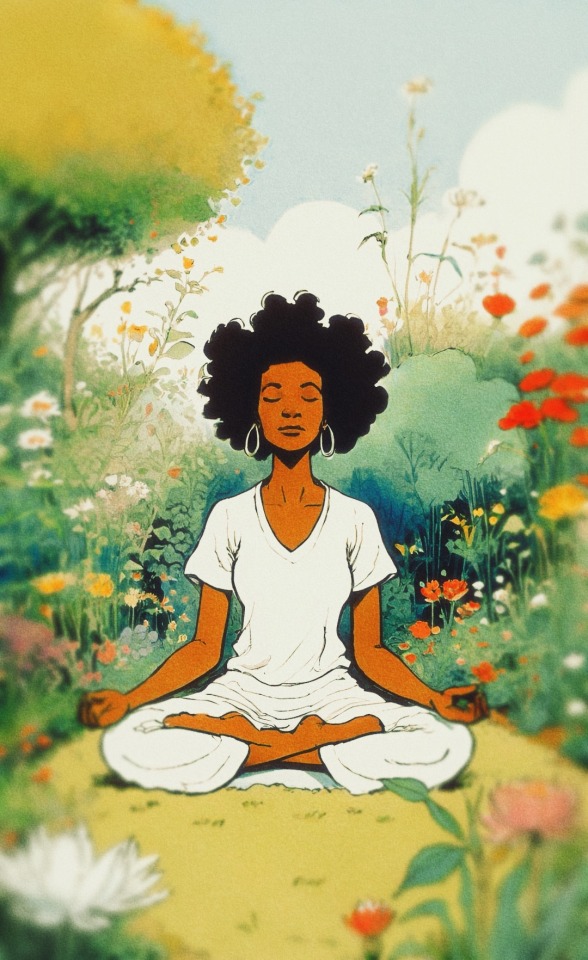
I can learn to center myself and combat my own negative thoughts
#pagan#spiritual healing#healing#spirituality#nature#paganism#earth#worship#self care#black witches#pagans of color#black witch#meditating#spiritual practitioner#black women#wellness#self empowerment#self esteem#gardens#photos#text#affirmations
24 notes
·
View notes
Text
Check out my Conscious Entrepreneurship Podcast with my bestie Stacy!
#women entrepreneurs#entrepreneurs#entrepreneur#women#women empowerment#black women#divine feminine#spiritual women#conscious women#besties#womenspodcast#womens entrepreneur podcast#podcast recommendations#podcasts#spotify podcasts#spotify#conscious entrepreneurship#Spotify
1 note
·
View note
Text
Visual Culture & Political Art : Angela Davis as an Afrofuturistic Icon
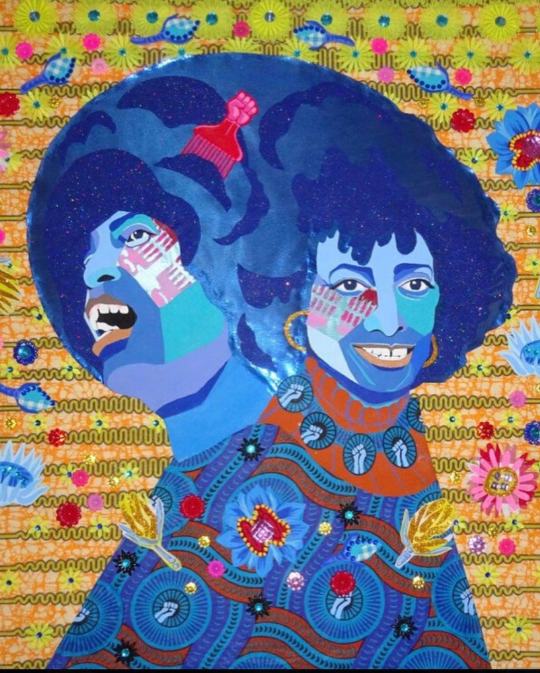
"Our Queen" by Erin LeAnn Mitchell
Angela Davis, an influential figure in civil rights and feminism, transcends conventional narratives as an Afrofuturistic icon, reshaping cultural perceptions through the dynamic interplay of visual culture and political art. Her iconic image, characterized by the defiant afro hairstyle and raised fist, becomes a symbol of resistance and empowerment within the framework of Afrofuturism. Angela Davis's visual representation, particularly in Erin LeAnn Mitchell's "Our Queen," extends beyond aesthetics, embodying the core vibe of Afrofuturism. It further delves into the intersection of visual culture and political art, highlighting Davis's role in challenging historical norms and envisioning a future where identity and culture are redefined on individual terms.

Afrofuturism, a cultural and artistic movement, combines elements of science fiction, speculative fiction, and fantasy to explore themes such as identity, culture, and liberation. It serves as a vehicle for political imagination, enabling marginalized communities to envision and create alternative realities. Erin LeAnn Mitchell's "Our Queen" exemplifies the evolution of Afrofuturist art, emphasizing empowerment and identity for black women and portraying Angela Davis at different stages as a metamorphosis over time. Afrofuturism celebrates the diversity of black experiences, challenging monolithic portrayals of blackness and embracing a multicultural perspective. Erin Mitchell's art challenges the portrayal of blackness by incorporating vibrant colors that represent spiritual elements and multi-layered comfort. Angela Davis, as a global and multicultural icon, signifies liberation for women of color across various cultures.
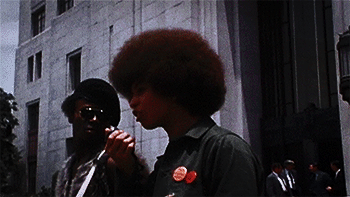
Beyond being an Afrofuturist icon, Angela Davis disrupts traditional beauty standards and advocates for the liberation of black women. Her image as a political prisoner turned professor, author, and public intellectual symbolizes liberation for all. The iconic raised fist signifies resistance and solidarity, turning her image into a form of political art that transcends mere representation. Davis's image defies binary oppositions, encouraging the blurring of boundaries and a more inclusive future. The representation of Angela Davis's body in Afrofuturist art challenges historical and societal norms. In "Seeing Differently" by Amelia Jones, the concept of "Bodies on Display" is explored, highlighting how visual culture can redefine societal perceptions of the body. Davis, through Afrofuturist art, represents a woman with agency over her own body, challenging the commodification of black bodies and influencing the visual culture discourse.
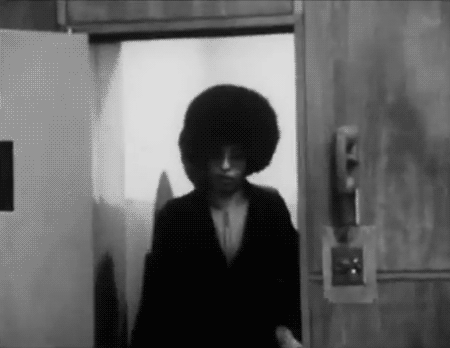
Angela Davis's Afrofuturistic representation reconceives difference by challenging stereotypical portrayals of women of color. Angela Davis's visual representation is inseparable from her involvement in various political movements. From her early activism in the Black Panther Party to her fight against systemic racism and mass incarceration, Davis's iconography displays the spirit of resistance and the pursuit of justice. Mitchell's artwork captures the duality of Davis's political journey, from the young, vital activist with the raised fist to the wise and peaceful intellectual, symbolizing the multifaceted nature of her contributions to political movements. In the context of visual culture, the notion of "Seeing Differently" is central to understanding how Afrofuturism provides an alternative perspective. Afrofuturism invites viewers to see beyond conventional norms, envisioning a future where difference is celebrated rather than marginalized.
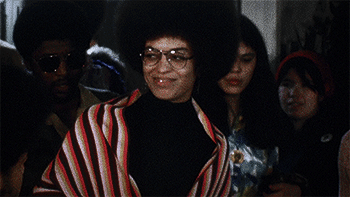
Angela Davis's iconography becomes a crucial component in the visual history of Afrofuturism, where identity is not confined by external expectations but defined by one's own terms. In "Seeing Differently," Amelia Jones theorizes the relationship between identity and visual history, emphasizing how visual representations contribute to the construction of identity. Davis's evolution from political prisoner to iconic Afrofuturist figure represents a dynamic shift in visual history, challenging preconceived notions and inspiring new narratives. The feminist slogan "The personal is political" resonates strongly in Angela Davis's image and artworks like "Our Queen." Davis's personal journey, from incarceration to academic prominence, is intrinsically tied to her political activism. The Afrofuturistic representation of Davis as a queen signifies not only personal triumph but also a collective political statement. Mitchell's artwork encapsulates the personal and political dimensions, illustrating how Davis's identity and visual representation contribute to broader societal change.
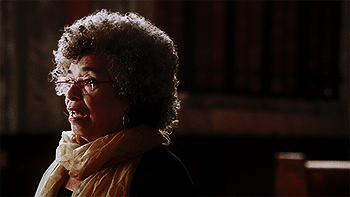
Davis's Afrofuturistic iconography stands at the intersection of visual culture and political art, challenging historical norms and influencing contemporary discourse. Visual culture, as an essential aspect of Afrofuturism, becomes a tool for political expression and reclamation. Davis's image, whether as a professor, activist, or global icon, embodies the transformative potential of visual culture in shaping societal perceptions and advocating for political change. Angela Davis emerges as a powerful Afrofuturistic icon, navigating the realms of visual culture and political art to challenge historical norms and envision a future where identity and culture are redefined on individual terms. Through her iconic image and Mitchell's Afrofuturist artwork, Davis becomes a symbol of resistance, empowerment, and inclusivity. Afrofuturism, with Davis at its forefront, invites a reevaluation of visual culture's role in political expression, paving the way for a more dynamic and inclusive cultural narrative. The concept of worldview, as discussed by Amelia Jones in "Seeing Differently," adds another layer to the Afrofuturistic exploration. Davis's visual representation, both in her iconic images and Mitchell's artwork, offers a distinct world view that challenges and expands societal perspectives. Afrofuturism, with Davis at its forefront, becomes a lens through which alternative worldviews are explored, emphasizing the importance of diverse narratives and challenging the dominant culture.
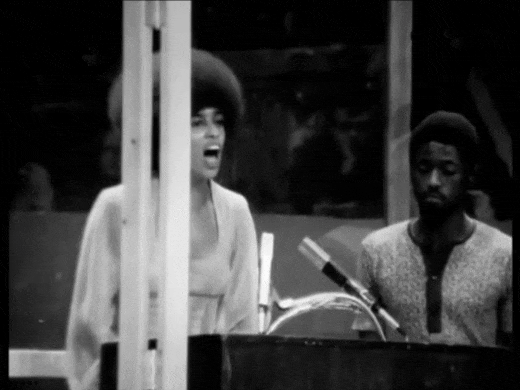
References:
Jones, Amelia. Seeing Differently. https://www.amazon.com/Seeing-Differently-History-Theory-Identification/dp/0415543835
"Afrofuturism and Its Possibility of Elsewhere: The Power of Political Imagination." The Conversation, https://theconversation.com/afrofuturism-and-its-possibility-of-elsewhere-the-power-of-political-imagination-166002.
"Wearing My Afro: Always a Political Act." The New Republic, https://newrepublic.com/article/122515/wearing-my-afro-always-political-act
"Afrofuturism: How Black Creatives Point to a Brighter Future." Domestika, https://www.domestika.org/en/blog/6930-afrofuturism-how-black-creatives-point-to-a-brighter-future
"Afrofuturism." UCLA Newsroom, https://newsroom.ucla.edu/magazine/afrofuturism.
"Artist Profile: Erin LeAnn Mitchell." Ruckus Journal, https://ruckusjournal.org/Artist-Profile-Erin-LeAnn-Mitchellh.
"Our Queen" by Erin LeAnn Mitchell, National Museum of African American History and Culture, https://nmaahc.si.edu/object/nmaahc_2010.55.2.

2 notes
·
View notes
Note
acknowledging that the binary exists AS a social construct, as an idea, is not agreeing with or following the binary. im not sure you understood me at all, maybe i wasnt clear enough. i am a gender abolitionist.
when i speak of gender i am using it as a general term to describe peoples connections to their identity and body on a more spiritual sense. it is abstract and undefined, because it is inherently subjective. everyone single person has a different felt sense of identity. the way we traditionally understand gender is through the lens of the binary, i do not. so i can understand your confusion. but yea, hopefully ive made it clearer, at least somewhat, that i do not believe in gender in a way that has anything to do with current understanding of that term.
and i understand that not everyone believes me, or even has been exposed to ideas like i have enough to form perspectives like this. so i am very understanding of people reinforcing the binary in some ways as a way to find deeper self meaning. there are obviously more outwardly harmful ways to do this, like feeding into toxic masculinity as a means of finding acceptance. but i dont prescribe to black and white thinking as much as possible (though, as an autistic person, that is my natural way of thinking). there is always nuance, there is grey. i even empathise with your position. its fuckin scary out here and of course you want to protect your interests as much as possible, and of those in similar circumstances. i respect that need, i dont respect the avenue youve chosen to meet it.
so while i dont believe in or agree with the gender binary and all that comes with it, im not going to demonise or vilify those that do, within reason.
so much of what you post makes it out like trans people ARE the enemy. that we are the ones doing active harm, not the ones being actively harmed. things like saying trans women are predators looking to enter womens spaces and erase them or assault them. OR that you believe we are defenseless, mentally ill little girls who have been lead astray and transed, forced to mutilate ourselves. like just such extreme and dehumanising beliefs. and its so sad because none of it is really actually logical or backed up by reason. its like, i agree with you up to a point and then we just veer sooo far into different extremes. the difference being mine advocates for collective and individual empowerment and health, while yours serves to create more divide and pain for all involved.
truly impressive display of doublethink that you repeatedly claim to be a gender abolitionist and also in support of transgender ideology
gender abolitionism good = transgender ideology bad
transgender ideology good = gender abolitionism bad
you simply can’t have both - these are by definition mutually exclusive beliefs. it doesn’t get more black and white than this. this isn’t a nuanced point
you are so invested in your ideology that you are engaging in doublethink - holding two contradictory beliefs and fighting tooth and nail to argue they align so you don’t have to admit you are wrong
do you really not see that?
how do you continue arguing with me with no shame when you are so clearly wrong?
you saying your ideology “advocates for collective and individual empowerment and health” and mine does not is laughably incorrect
the brutal truth: identifying as transgender is a self-centred and harmful ‘solution’ to a systemic societal problem.
you can’t abolish gender alone, so instead you buy into trans ideology for relief.
you don’t care/can’t acknowledge that this harms women because at least you’re alleviating your dysphoria - and that’s what matters to you.
your life has been hard so you must be right - your suffering proves your virtue. you are the hero and the underdog in your own story and everyone who criticises you is ‘harming’ you. any action you take to should be free from criticism because you are a good person just trying to alleviate your own pain.
you simply cannot bear to admit that your suffering does not exempt you from responsibility for causing harm in upholding patriarchy, which is what you are doing
because you have made your ideology a part of your identity you can’t even entertain criticism as it is now a personal attack against you
you call me saying this ‘vilifying’ trans people because it’s impossible for you to admit what you’re doing is wrong
gender is sexist. transgender ideology is sexist. you still haven’t refuted this.
you’re still not defining gender in a way that isn’t sexist - you’re just desperately trying to obfuscate and distance yourself from the truth which is gender = sexist stereotypes about womanly and manly feelings, behaviour, appearance, etc.
your ideology is inherently sexist
just be yourself and do whatever the fuck you want. you must not support the patriarchy by giving yourself a ‘gender identity’ to cope
this will be my last response as this is now arguing-with-a-conspiracy-theorist territory
i hope this has prompted others to genuinely reflect if not anon
#new followers i see u#i won’t be shouted down by repetitive claims that i’m wrong when i’m so clearly in the right#i won’t be told i’m causing harm when your ideology is harmful#radical feminism#gender critical
6 notes
·
View notes